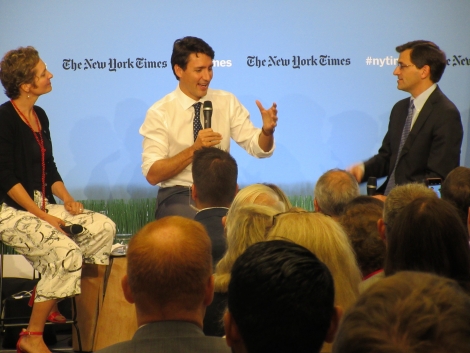On June 22, Prime Minister Justin Trudeau spoke in Desautels Hall as part of an event hosted by The New York Times and the Martin Prosperity Institute of Rotman School of Management.
The discussion, titled “Trade in the balance: Canada-U.S. Relations,” was hosted by Peter Baker, Chief White House Correspondent of The New York Times, and Catherine Porter, Canada Bureau Chief for The New York Times and former columnist for the Toronto Star. In attendance was U of T President Meric Gertler and members of the Liberal Party Chrystia Freeland and Gerald Butts.
The discussion focused heavily on Trudeau’s relationship with the White House and US President Donald Trump, but touched on a variety of other subjects as well, ranging from international trade deals to Canadian immigration policy.
On his relationship with Trump, Trudeau insisted on his commitment to working amicably with the US President despite their disagreements on major policy issues.
“I will continue to engage with him, including on things where we have clear disagreements, like the Paris Accord, by finding things where we can work together, on energy efficiencies [and] on fighting pollution,” Trudeau said.
Trudeau emphasized the necessity of maintaining good relations with the US, likening Canada’s relationship with the US to sleeping next to an elephant: “No matter how even-tempered the beast, you’re affected by every twitch and grunt.”
When pressed on the future of the North American Free Trade Agreement (NAFTA), Trudeau stated there is a “100 per cent chance” that Canada will still be in the free trade pact a year from now, but in four years, “Who knows?”
“NAFTA’s been updated a dozen times over the years, and we will do it again to update it to what the challenges we’re facing now are,” Trudeau said.
The event comes as part of an effort on behalf of the New York Times to expand their coverage of Canada, having quadrupled the number of staff reporters covering Canadian stories since 2016.
“In terms of our ambitions to grow, we certainly see Canadian university students as an advantage,” said Jodi Rudoren, Editorial Director of NYT Global. “Someone who’s 20 [years old] has a lifetime of subscriptions, rather than someone who’s older.”
“We think it’s really important to bring discussions about democratic capitalism to students,” said Jamison Steeve, Executive Director of the Martin Prosperity Institute.



